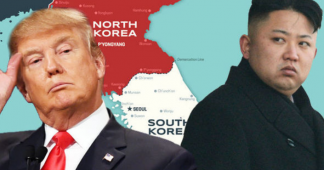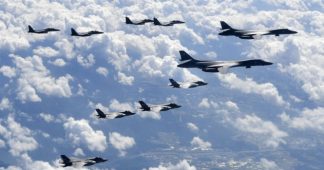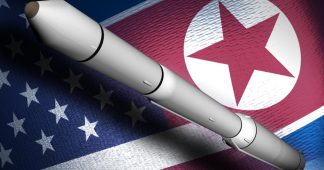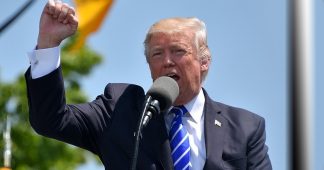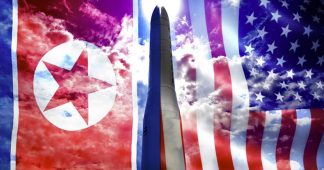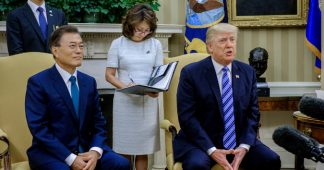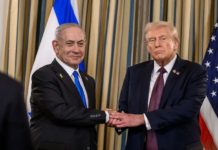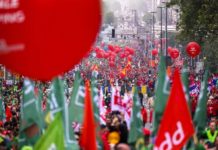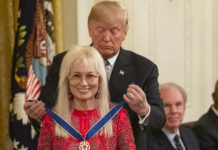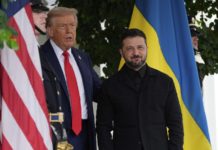By Peter Symonds
26 September 2017
As the Trump administration escalated its threats and military provocations, North Korean Foreign Minister Ri Yong-ho warned Monday that Trump’s inflammatory speech to the UN last week and subsequent statements amounted to a declaration of war on his country.
“The whole world should clearly remember it was the US who first declared war on our country,” Ri said. “Since the United States declared war on our country, we will have every right to take countermeasures, including the right to shoot down United States strategic bombers even when they are not inside the airspace border of our country.”
The warning comes just days after the US provocatively flew two B1-B strategic bombers accompanied by fighter jets close to North Korea’s east coast in what the Pentagon described as its most northerly mission this century. A Pentagon spokesman declared that the mission was to “send a clear message that the president has many military options to defeat any threat.”
While the US war planes apparently flew in international airspace, the threat to North Korea is just as acute. It has no way of knowing whether this mission will be the one to intrude and attack or unleash a deadly payload of missiles from a distance. In either case, the North Korean military would have only minutes to respond.
The latest US military fly-past is part of a deliberate escalation coming less than a week after two B1-B bombers, along with US and South Korean warplanes, dropped bombs at a South Korean training range close to the Demilitarised Zone (DMZ) separating the two Koreas. The operation was the first live-fire exercise involving strategic bombers, which in the past have been restricted to a fly-over of South Korea.
Within hours of Ri’s comments, White House press secretary Sarah Huckabee Sanders told a news briefing: “We have not declared war on North Korea. And frankly any suggestion of that is absurd.” The absurdities, however, lie in her statement. These have been ignored by a compliant American and international media that vilifies the Pyongyang regime and portrays the small, economically backward country and its limited nuclear arsenal as a grave threat to the US and the world.
In the first place, US imperialism has waged one illegal war of aggression after another over the past 25 years without formally declaring war—destroying Iraq and Afghanistan followed by Libya and Syria. The North Korean regime can only conclude from the Trump administration’s words and actions that it confronts the very real danger of an imminent attack by the world’s most powerful military.
In his speech to the UN, President Trump bluntly warned that the US would have “no choice but to totally destroy North Korea” if forced to defend itself. There is nothing defensive about Trump’s threat as he made clear on Sunday, when he tweeted unequivocally that Ri and North Korean leader Kim Jong-un “won’t be around much longer.”
Trump and his cabal of generals in the White House have already drawn up detailed plans for the total destruction of North Korea. As Trump tweeted last month, the military options against North Korea are “locked and loaded.” The Trump administration’s incessant drum beat of threats and military provocations has only one aim: to force the Pyongyang regime to unconditionally capitulate or to goad it into action that can be seized upon as the casus belli for a war of annihilation.
Washington has placed the world on the brink of a catastrophic war that would quickly claim the lives of millions. Such are the tensions in North East Asia that any incident, whether deliberate or accidental, could set off a conflict with incalculable consequences.
The dangerous logic behind Washington’s plans for total war was underscored by Trump’s national security adviser H.R. McMaster in a speech yesterday hosted by the Institute for the Study of War. The Trump administration, he explained, had gamed “four or five” scenarios for dealing with Pyongyang, he declared. “Some are uglier than others.”
McMaster ruled out any negotiations unless North Korea accepted intrusive inspections of its nuclear and missile facilities and declared that it would give up its nuclear weapons. North Korea already has glaring examples of what has happened to countries that chose to capitulate—giving up real or imagined weapons of mass destruction did not stop the US from invading Iraq and Libya and killing its leaders.
Far from seeking to avoid war, McMaster last week defended Trump’s bellicose speech at the UN, declaring that it was “completely appropriate.” He also hit out at those who have warned that there is no military option in dealing with North Korea due to its ability to retaliate with conventional and nuclear weapons. “There is a military option,” he emphasised and warned that time was rapidly running out.
In his speech yesterday, the lieutenant general made clear that the US is not considering isolated, surgical strikes, but a massive and overwhelming attack—conventional and/or nuclear—that would destroy North Korea’s capacity to retaliate. “There’s not a ‘precision strike’ that solves the problem,” he said. “There’s not a military blockade that can solve the problem. What we hope to do is avoid war, but we cannot discount the possibility.”
That US imperialism is preparing such a monstrous crime underscores the enormous economic, social and political crisis in Washington as it wields its military might in a desperate bid to establish its unchallenged global dominance. The threat of “total destruction” is aimed not only at North Korea, but at any country in the world—ally or rival—that does not submit to its economic and political diktats.
The drive to war cannot be halted by Pyongyang’s bluster or its attempts to construct a rudimentary nuclear arsenal, which in the final analysis will do nothing to defend the North Korean people and plays directly into the hands of Washington. Its lurid threats only create deep rifts between workers in North Korea and those in South Korea, Japan, the United States and around the world who are deeply opposed to war.
The only means to prevent war is through the political fight for a movement of the international working class unified by a socialist perspective and animated by the determination to put an end to the outmoded capitalist system that is the fundamental cause of geo-political tensions and conflict.
